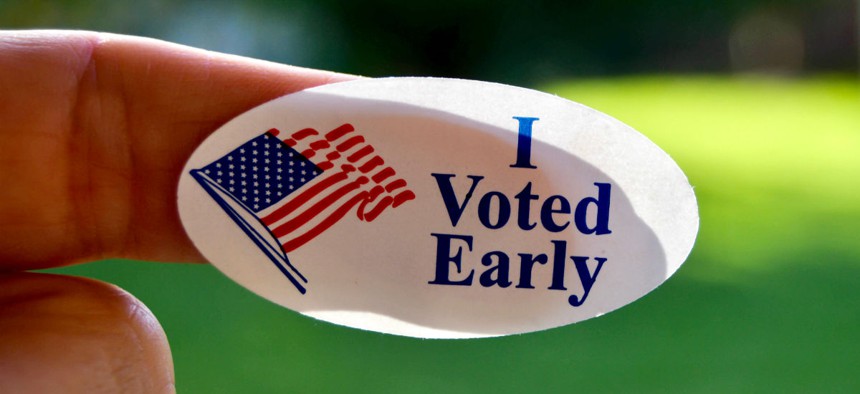‘Fired Up’ Federal Employees Take Leave and Volunteer Nights to Get Out the Vote
Union leaders say their members’ engagement levels for the midterm election is unprecedented.
Most nonpartisan forecasters are projecting a record turnout for the 2018 midterm election on Tuesday, and federal employees are aiming to make their contribution.
Thousands of federal employees have spread across the country to knock on doors, make phone calls and otherwise encourage potential voters—and their own members—to go to the polls and support their preferred candidates. Feds, operating in their private capacities on their own time, have taken to their political battle stations largely through their unions. Leaders of the labor groups said the participation was unprecedented for their organizations.
The American Federation of Government Employees, for example, sent volunteers to every state in the country, aside from Hawaii. Some of their members have taken leave from their federal jobs, while others are campaigning on nights and weekends. Their efforts have eclipsed even what AFGE saw during the 2016 election, according to J. David Cox, the union’s president.
President Trump’s executive orders aimed at reforming civil service laws and curbing the power of federal employee unions have “probably fired our members up more than they’ve ever been fired up,” Cox said.
While AFGE has focused on knocking on doors, the National Treasury Employees Union has focused on its own members. The union set up an internal phone banking system to allow members to reach out to their union associates to remind them to vote and to promote the organization’s endorsees. The federal workers, operating in their free time, have made tens of thousands of calls, according to NTEU President Tony Reardon.
“This year we had a really huge, successful get-out-the vote program,” Reardon said. “This is the first time we have mobilized in these numbers in terms of states and calls we’ve made,” adding that the effort culminated in “significantly more than we’ve ever done in the past.”
The union has focused on Senate races, promoting Democrats in toss-up races such as Sens. Heidi Heitkamp, N.D., Jon Tester, Mont., Claire McCaskill, Mo., and Bill Nelson, Fla., as well as Reps. Kyrsten Sinema, Ariz., and Beto O’Rourke, Texas. They are also supporting senators in safer seats but who have historically supported their causes, such as Tim Kaine in Virginia and Ben Cardin in Maryland.
“We really believe federal employees can have a big impact in important races,” Reardon said, explaining the “best way to reach out in a member-to-member strategy is to call them in their homes.”
AFGE has made 372 endorsements, and, citing redistricting concerns, is for the first time also focusing on state legislature and gubernatorial races, Cox said. The union does not issue endorsements until candidates fill out a questionnaire and meet with local council leaders. It has particularly focused its resources on Texas, Florida, Georgia, North Carolina, Tennessee, Colorado, California and Pennsylvania.
Both NTEU and AFGE have issued grades for congressional members based on how they voted on key issues. They have sent physical and electronic mailers to their members for guidance on races up and down the ballot. NTEU represents 150,000 federal workers, while AFGE represents 700,000.
Cox expressed optimism that his union’s endorsees will be successful come Tuesday evening.
“This has been a tough year for AFGE,” Cox said. “Next year is going to be better.”




